Beneath the Planet of the Apes ⭐️1/2
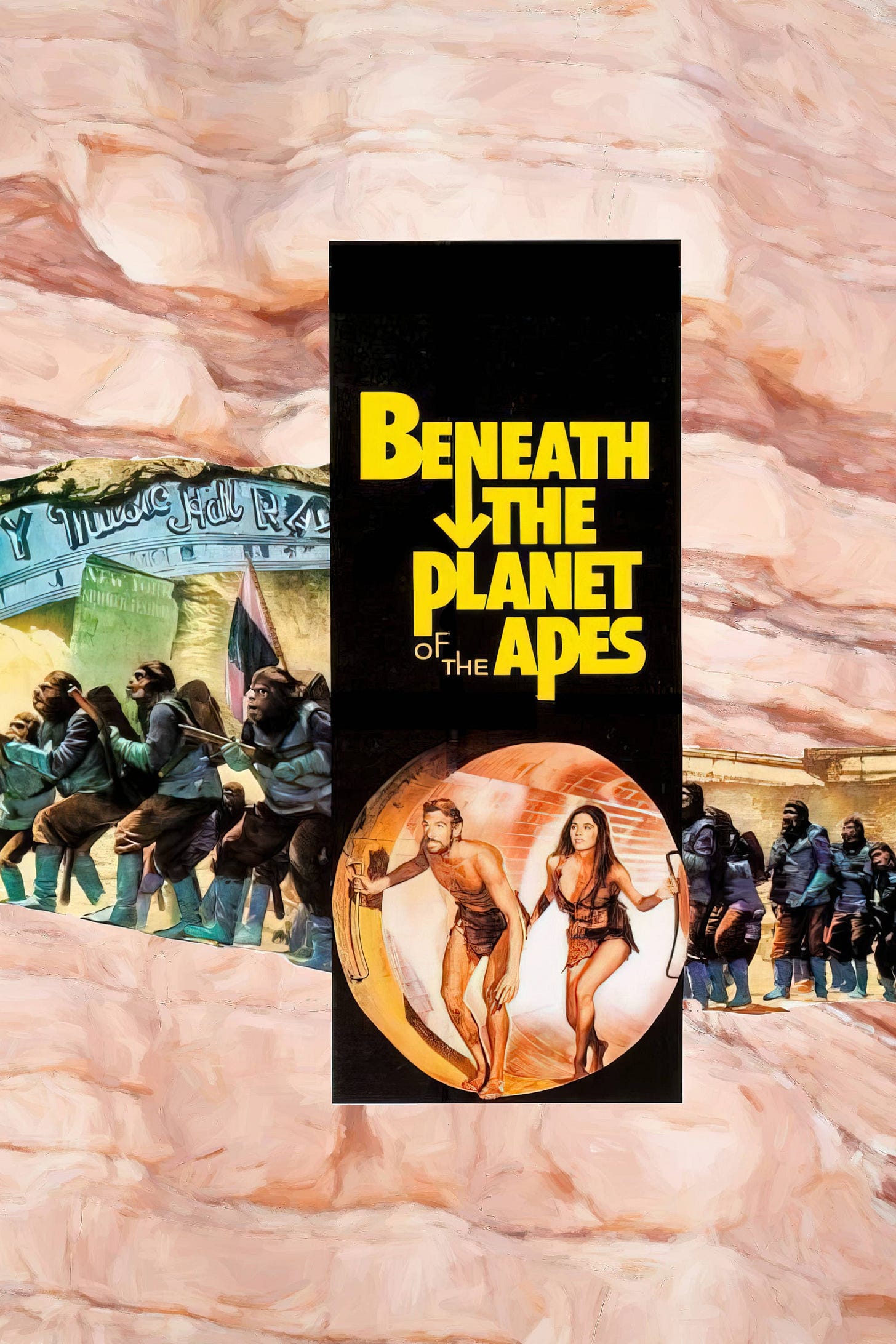
Planet of the Apes (1968), produced for $5.8 million, earned a whopping $33.3 million at the box office. For the studios, the message was clear: more movies means more money. So, in the span of four years, 20th Century Fox would release four more Planet of the Apes films. With each successive installment, the budget would decrease further, but the box office returns would remain profitable.
The quality of the films, however, quickly declined. The temporal continuity of the series gets wholly fucked, and each film’s tone and thematic focus are highly variable. It is the untempered, unqualified pessimism towards human nature that unites the original Planet of the Apes films.
The iconic twist ending of Planet of the Apes left viewers with questions to ponder: How did Earth devolve into the Planet of the Apes? What mysteries will Taylor and Nova discover in the Forbidden Zone?
Audiences had two years to mull over these questions until Beneath the Planet of the Apes would come along, offering absurd and unsatisfying answers that only work to undermine the emotional impact of the original’s ending. It isn’t a good film by any metric, yet I can’t help but appreciate that Beneath the Planet of the Apes is an unrepentantly bonkers display of hopelessness and despair.
🚨🚨FULL SPOILER ALERT🚨🚨
The film begins by replaying the ending of the first film, and Taylor and Nova ride into the unknown. Then, a team of astronauts crashes into a desert. A blonde man with blue eyes sits beside his dying crewmate. The survivor’s name is Brent, and despite looking mighty similar, Brent only wields a fraction of Taylor’s charisma and gravitas.
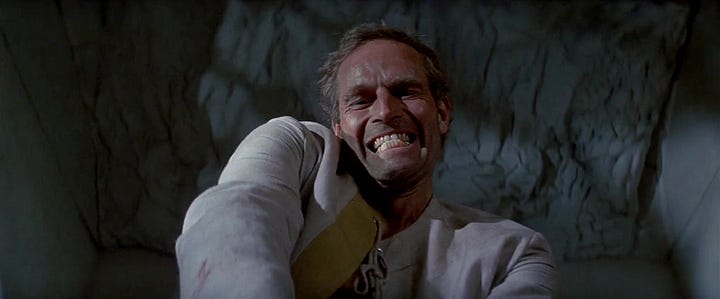
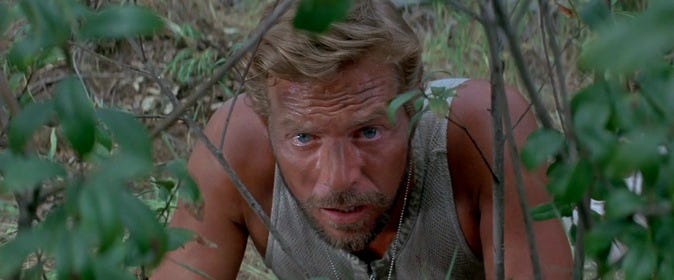
Shortly after his crash landing, Nova moseys up on horseback. Brent spots dog tags hanging around her neck. They belong to Taylor, exactly the man Brent (and his now deceased crew) were sent to rescue. “Where is Taylor?” Brent shouts at Nova, unaware that humans like Nova are incapable of speech. Nevertheless, being berated by Brent triggers a flashback for Nova.
Taylor and Nova ride on horseback through the desolate forbidden zone. Suddenly, they are beset by walls of fire, lightning, and chasms opening before their eyes. Taylor tells Nova to find Zira if they get separated. Taylor grabs a gun, walks a few paces, and promptly disappears into a wall. It’s all exactly as disorienting as it sounds.
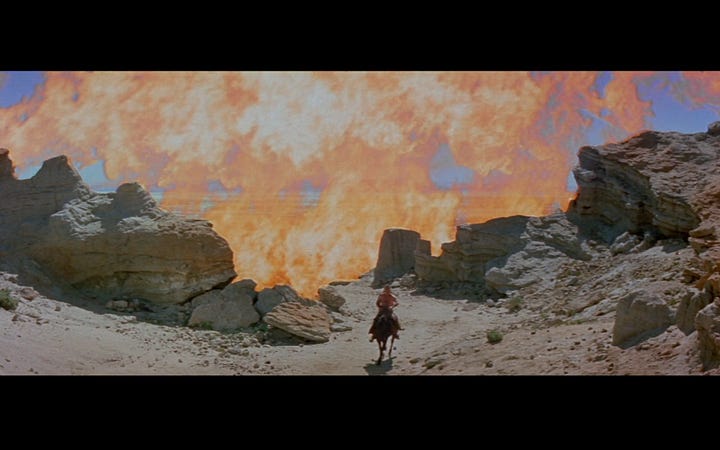
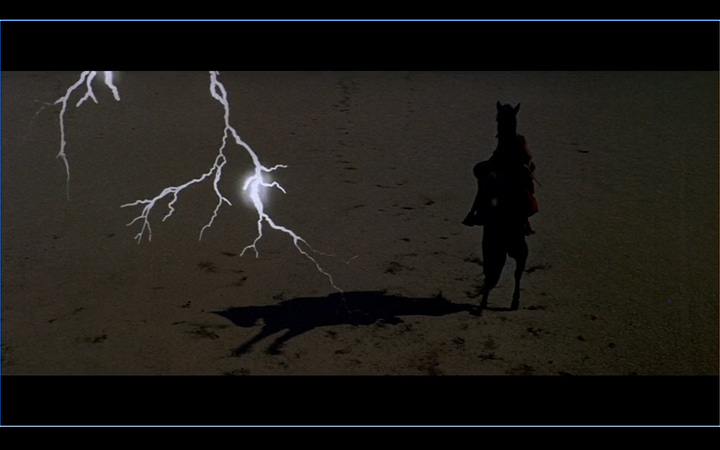
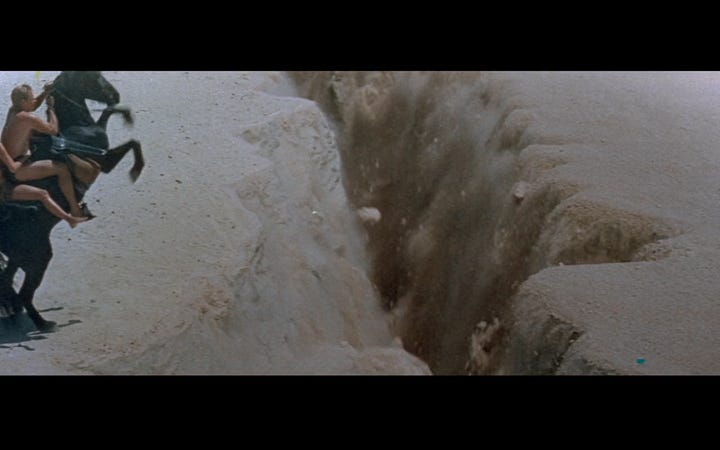
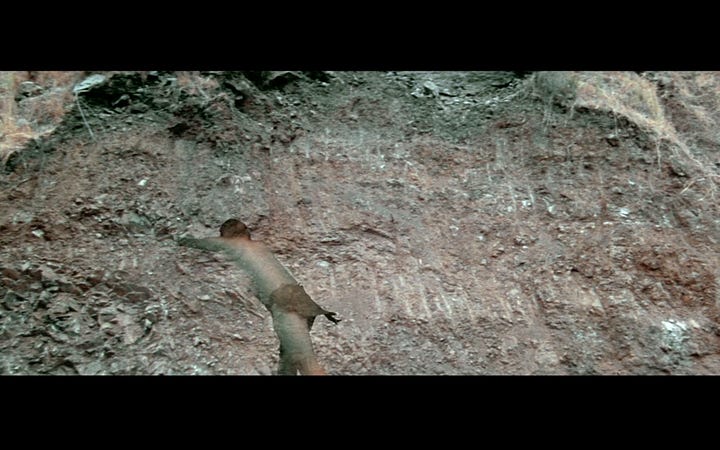
Charlton Heston had no interest in reprising his role as Taylor. He had already made his Planet of the Apes film and was convinced that sequels were innately inferior to the originals. It turns out Heston was right. However, he returned as a personal favor to Authur P. Jacobs, the publicist turned producer who initially saw the cinematic potential in Boulle’s novel. Heston would return on one condition: he only had to appear briefly at the film’s beginning and end. As a result of these terms, the film offers this nonsensical sequence in the hope of maintaining some semblance of narrative continuity.
In reality, Heston’s opening scene completely derails the narrative. In the following scene, Brent and Nova eavesdrop on a meeting in Ape City. This scene introduces Beneath the Planet of the Apes social and political content. However, viewers are likely still wondering what the fuck happened to Taylor in that desert. I certainly was. Seventeen minutes into the movie, we’re already lost in the sauce.
Ursus, a militant gorilla, addresses the ape assemblage as their military commander. He speaks of the “parasitic” humans feeding off the land that belongs to the Apes. Ursus has a plan to ensure ape supremacy. He speaks of the Forbidden Zone and claims that someone or something is inhabiting it. He knows “what every soldier knows: the only thing that counts in the end is power! Naked, merciless force.”
“Our great Lawgiver tells us that never, never will the human have the ape's divine faculty for being able to distinguish between evil and good. The only good human is a dead human! But those fortunate enough to remain alive will have the privilege of being used by our revered Minister of Science, the good Dr. Zaius.”
“It is our holy duty to put our feet upon [the forbidden zone], to enter it, to put the mark of our guns and our wheels, and our flags upon it. To expand the boundaries of our ineluctable power. And to invade!”
-Military Commander Urus
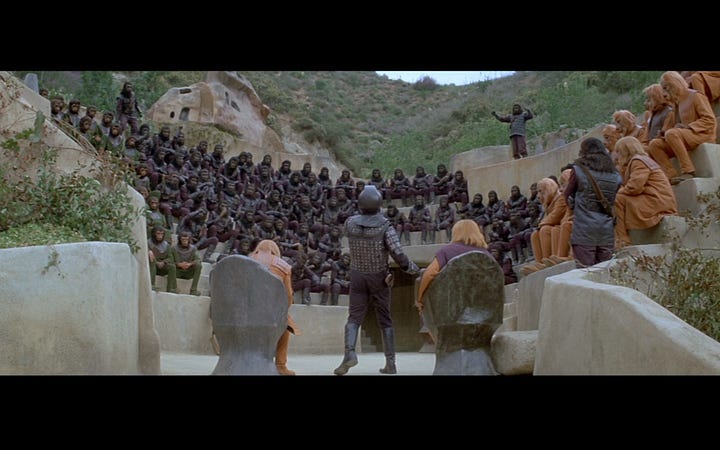
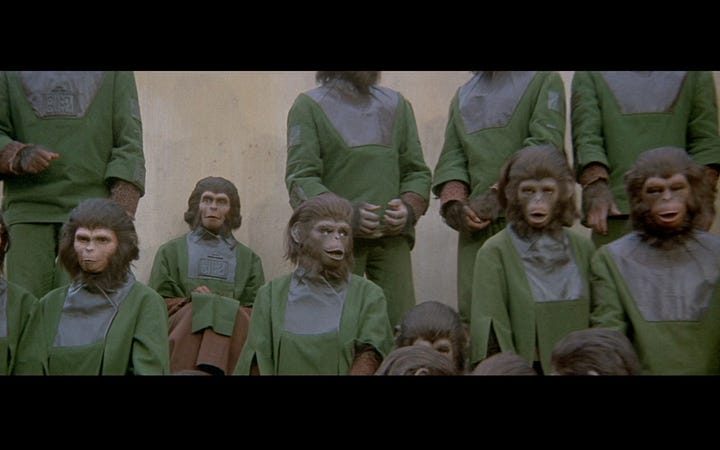
Ursus’ fellow gorillas scream their excitement. The orangutans, leaders of the faith, tentatively stand and clap. The chimpanzees are the least enthused, with Zira refusing to stand and cheer with the rest of the Apes.
Zira’s refusal to act against her beliefs once again places her in the crosshairs of the Apes’ regime. This time, she clashes with the militant wing of Ape society, the gorillas, whom she claims, “are cruel because they're stupid! All bone and no brain!”
Zira is the first to express intra-ape prejudice and will continue to espouse her beliefs in future installments. It’s noteworthy that Zira, usually the voice of reason and conscience, is so steadfast in her denigration of her fellow apes. Zira does not single out bad actors, condemn certain behaviors, or articulate a philosophical disagreement with the gorillas. Instead, it boils down to a generalized statement of contempt: all gorillas are cruel because all gorillas are stupid.
It is also worth noting that the film disavows Ursus’s lust for conquest but does not problematize Zira’s statement of prejudice. Instead, it maligns Ursus and his fellow gorillas in a broad repudiation of military campaigns and escalating violence.
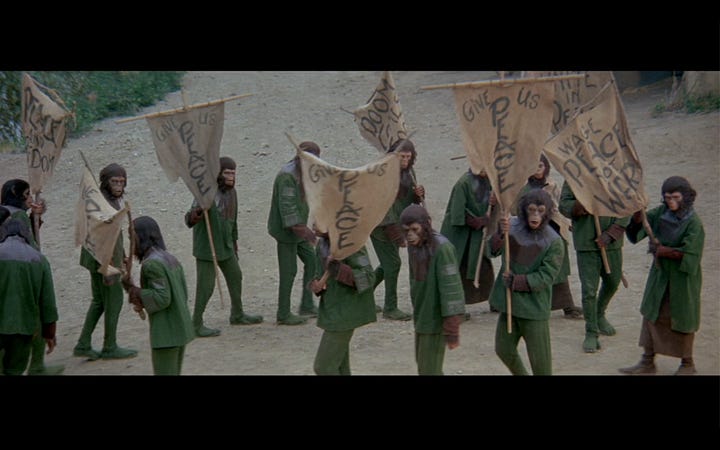
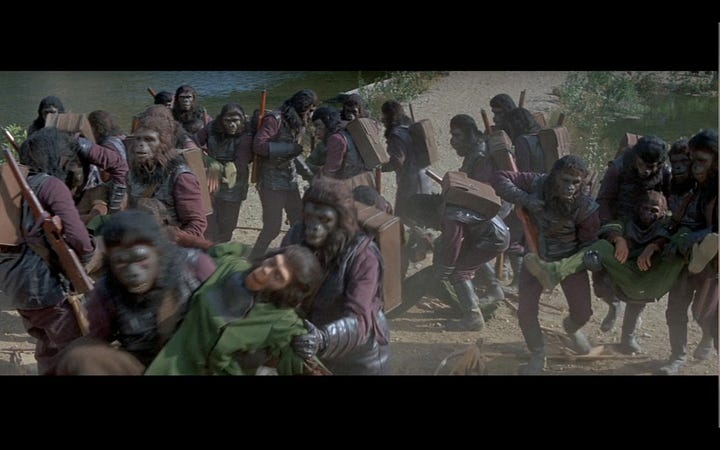
As Ursus beats the drums of war, chimpanzees protest with signs that read, “We want freedom! Give us peace!” Their peaceful protest is disbanded in a display of “gorilla brutality.” The conflicts in ape society and the actions of the gorillas nod to the protests of the late 1960s, particularly with regard to the Vietnam War. In service of this unsubtle social commentary, the film uncritically indulges Zira’s prejudice.
Amid the crude commentary, there still exists moments of dialogue that tap into the original film’s strengths, if only for a few moments. For example, Dr. Zaius expresses his reservations to Ursus in a scene that, for some reason, is set in a sauna.
Dr. Zaius: Well, General, I still think you're being hasty.
General Ursus: No, Doctor. Decisive. Now we invade or we starve. It's as simple as that.
Dr. Zaius: And as dangerous.
General Ursus: What is more dangerous than famine, Doctor?
Dr. Zaius: The unknown.
As momentum for Ursus’ military campaign proves unstoppable, Dr. Zaius finds himself unwillingly roped into the expedition. The ascendance of militarism over faith forces a realignment of Zaius’ loyalties, and he turns to Zira, of all people apes, to find a common cause. Before leaving, he visits Zira’s home and says:
Dr. Zaius: Someone or something has outwitted the intelligence of the gorillas.
Zira: That shouldn’t be difficult.
Dr. Zaius: We apes have learned to live in innocence. Let no one, be it man or some other creature, dare to contaminate that innocence.
Zira: [scoffs]
Dr. Zaius: Why? Is innocence so evil?
Zira: Ignorance is!
Dr. Zaius: There is a time for truth.
Zira: And the time is always now. Are you asking me to surrender my principles?
Dr. Zaius: I am asking you to be the guardians of the higher principles of science in my absence. I am asking for a truce with your personal convictions in an hour of public danger.
Amid the flashes of interesting dialogue, Brent and Nova sneak around. They are aided by Zira and Cornelius, who provide the humans with provisions. Brent and Nova attempt to escape but are promptly captured by gorillas on horseback. The humans are brought back to Zira’s lab, and she helps them escape again. They are, once again, pursued by gorillas on horseback and take refuge in a tunnel that leads underground.
This middle section of the movie is exceedingly tedious. The human characters have nothing to do until Brent and Nova go beneath the Planet of the Apes. Their circular horseback chases are a way to pad the film’s runtime, providing the illusion of action as the plot stalls.
Once underground, Brent and Nova find themselves exploring the ruins of what was once New York City. This reveal will not surprise anyone who has seen the original film. Brent begins waxing philosophical about nuclear armageddon, wondering aloud if there was any value to “all those talks around all those tables.” Diplomacy, it seems, is futile.
From here, the film devolves into absolute insanity. Brent finds a faucet of water and, after drinking from it, is overwhelmed by a compulsion to drown Nova. He nearly does but overcomes the urge by shouting, “Get out of my head,” and backs into a set of giant doors, slamming them shut behind him. There, Brent finds a man worshipping a golden atomic bomb.
Brent is taken to face a tribunal because it’s not a Planet of the Apes film without a tribunal. Rather than apes, Brent’s tribunal is composed of humans that have survived underground and worshiped the Bomb. It’s difficult to convey how poorly conceived and executed this sequence is, but it ranks among my all-time “best of the worst.”
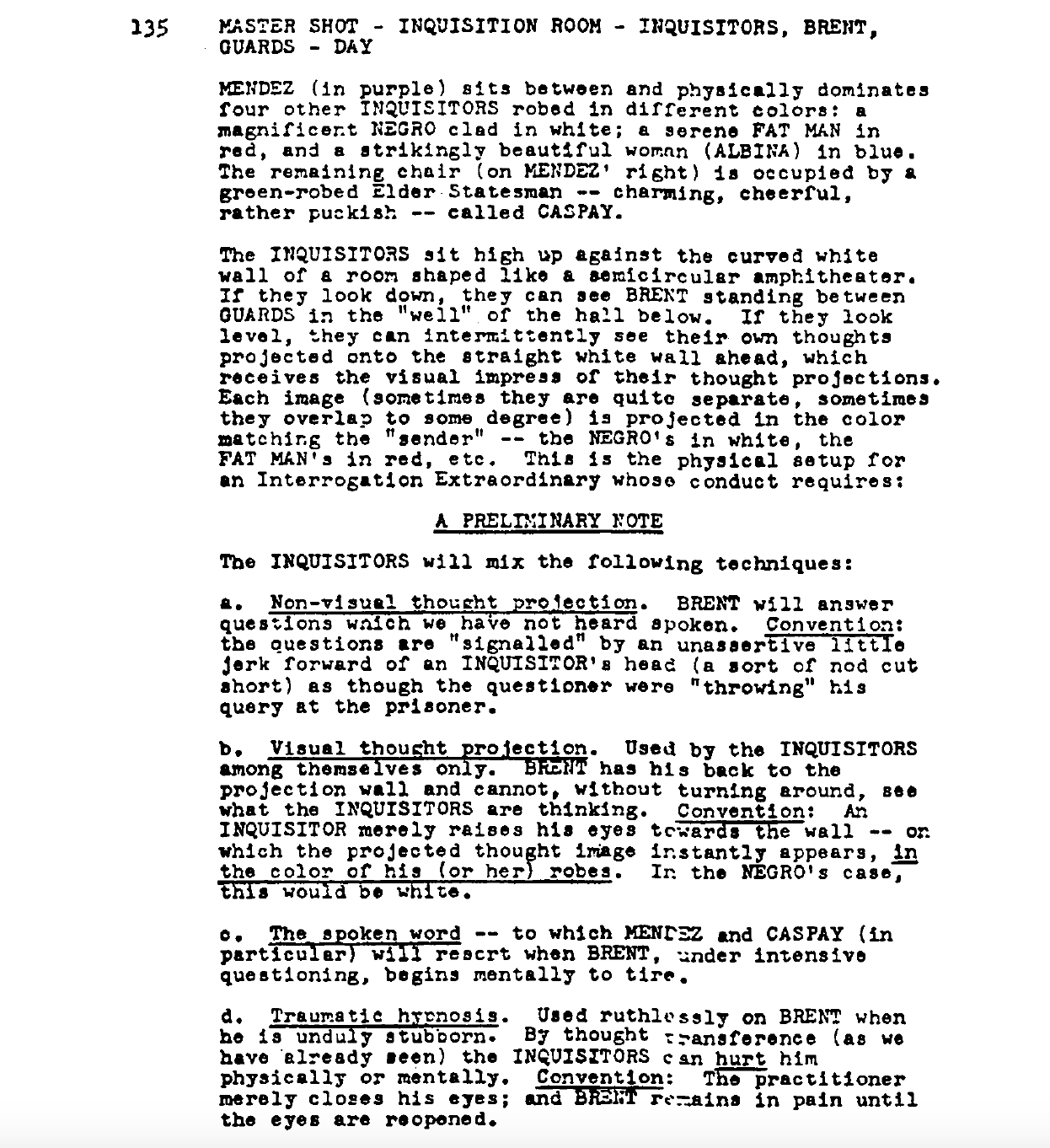
These humans communicate telepathically with a slight nod and quiet beep. It is, quite possibly, the dumbest way to make characters communicate during an interrogation. A nod and a beep pose an unspoken question. Brent’s responses both imply and answer their inquiry. This uniquely uncinematic method of interrogation continues for three whole minutes until this happens:
This moment begs the question: Why the fuck is this movie like this? Who thought this was a good idea? I’m fucking gobsmacked every single time I watch this scene.
There’s no time to ponder the absurdity because the rest of the film goes petal-to-the-metal as it speeds towards its gloriously misguided conclusion. When the ape army enters the forbidden zone, the telepathic humans project visions of apes burning and a bleeding statue of “The Lawgiver,” a religious figure and author of the Ape’s Sacred Scrolls, to scare off their invaders. Dr. Zaius sees through the illusion, and the army presses forward through illusory flames.
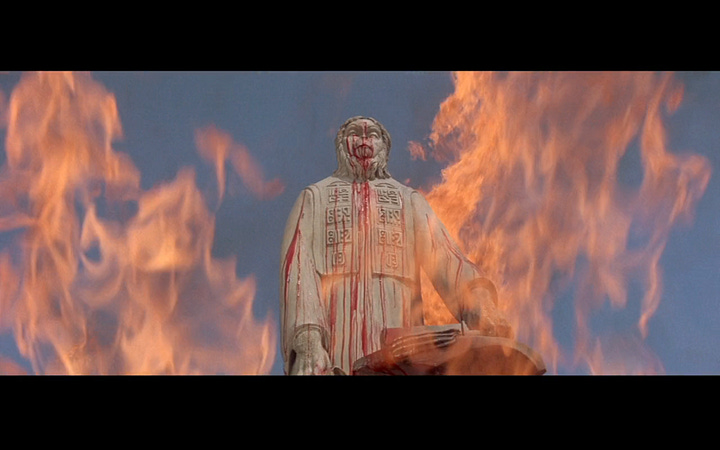
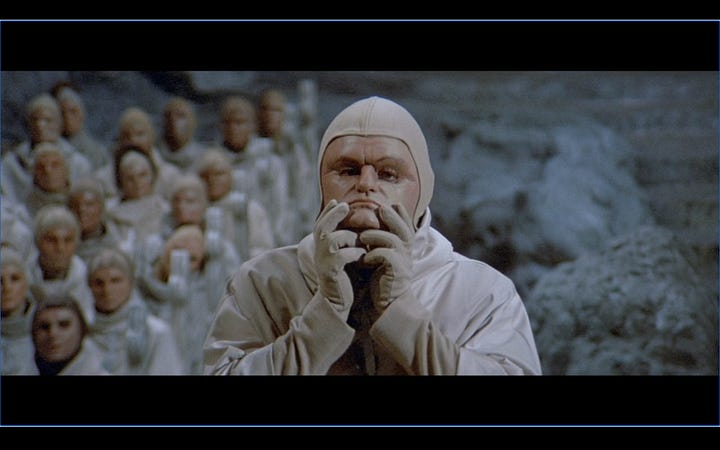
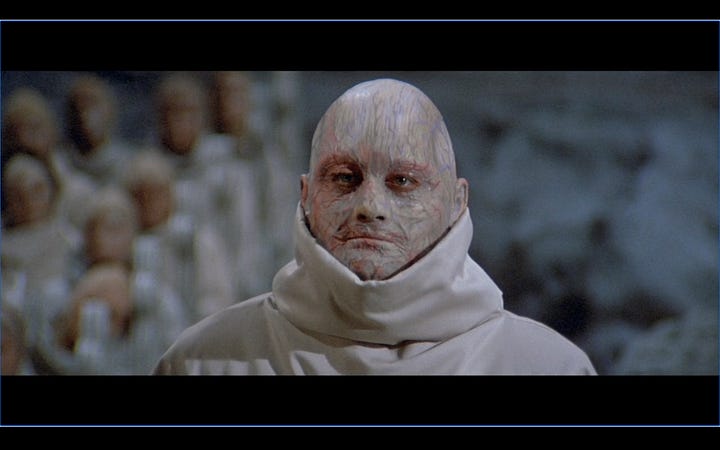
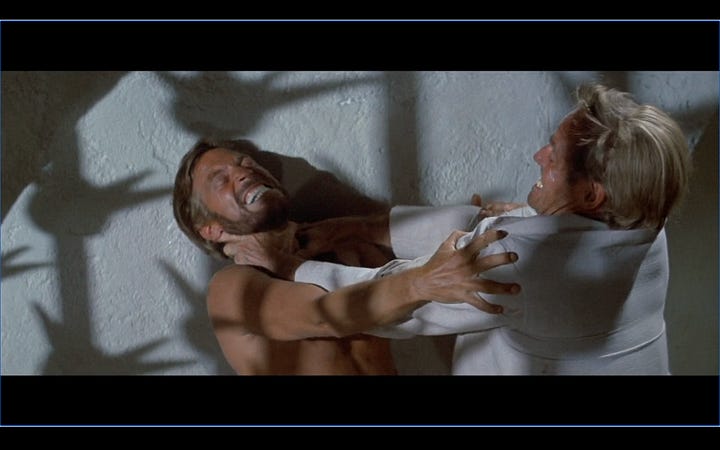
Meanwhile, the underground telepaths conduct a religious ceremony worshiping the Alpha Omega bomb. They peel off their faces, revealing themselves to be hideous mutants. They put Brent in a Cage with Taylor, who was captured at the film’s beginning. They are telepathically forced to fight to the death, but Nova stops their mortal combat by uttering her first word, “Taylor,” which gives our heroes the opportunity to kill the telepath controlling them.
The ape’s army invades the mutant’s underground lair. Nova is killed in the crossfire by a gorilla, devastating Taylor.
Taylor: Nova, oh God. We should let them all die. The gorillas, every damn— Look what it’s come to. It’s time it was finished. Finished.
Ursus, Dr. Zaius, and the gorillas storm the Church of the Bomb. Mendez, one of the mutants, arms the Alpha Omega bomb and declares it his God. He is promptly shot, and Ursus commands his army to pull down the bomb against Dr. Zaius's protestations. The gorillas unwittingly release a toxic gas (maybe? It’s not clear), and Ursus, reaching for the launch panel, declares he “will do something to stop it.” Before Ursus fiddles with technology he doesn’t understand, Brent draws his attention by banging on a piano. The alerted gorillas shoot Taylor, but Brent manages to snipe Ursus.
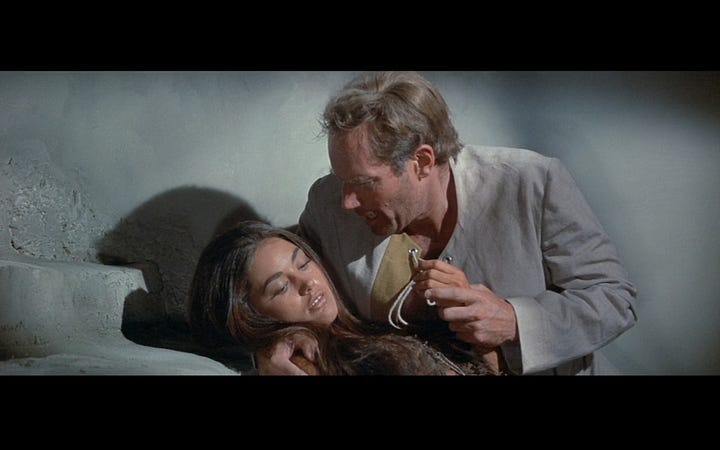
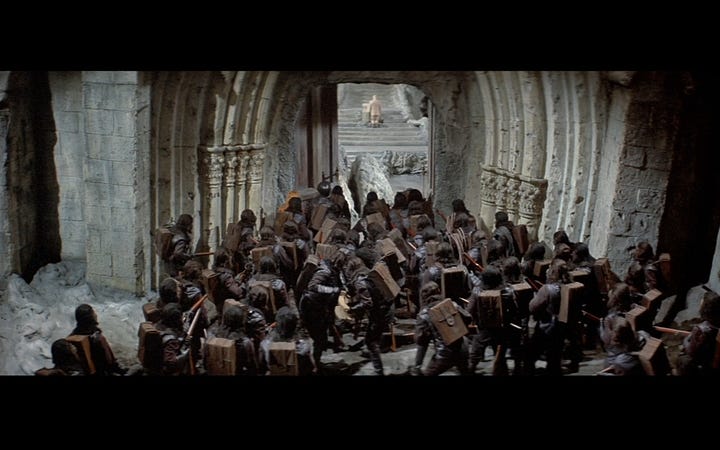
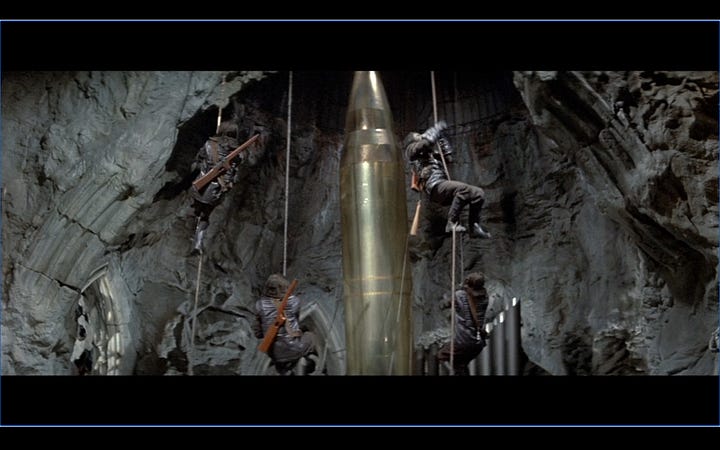
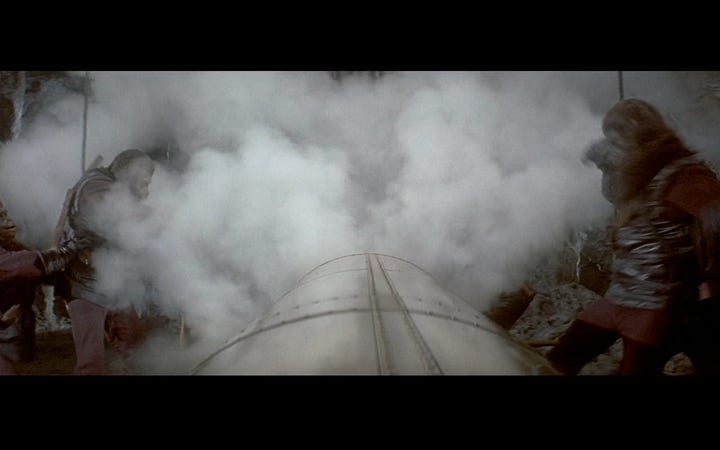
A mortally wounded Taylor kneels, holding his hand over his bleeding heart. Meanwhile, across the room, Brent is shot in the head by a gorilla firing squad. Taylor calls Zaius a “bloody bastard” before falling forward and triggering the Alpha Omega bomb. A loud rumbling drowns out all other noise as the screen fades to white.
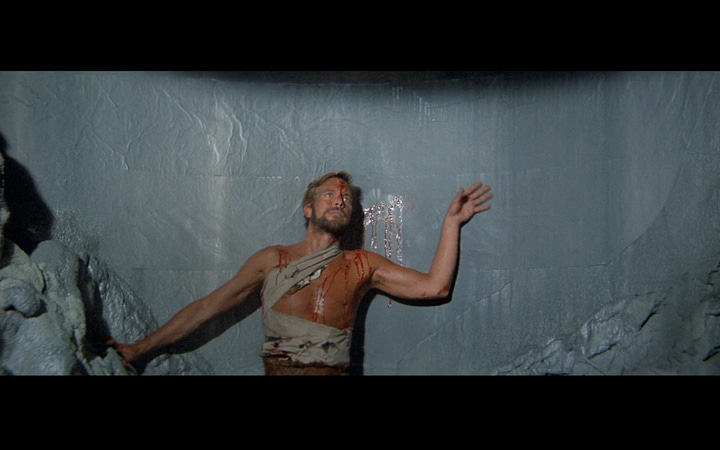
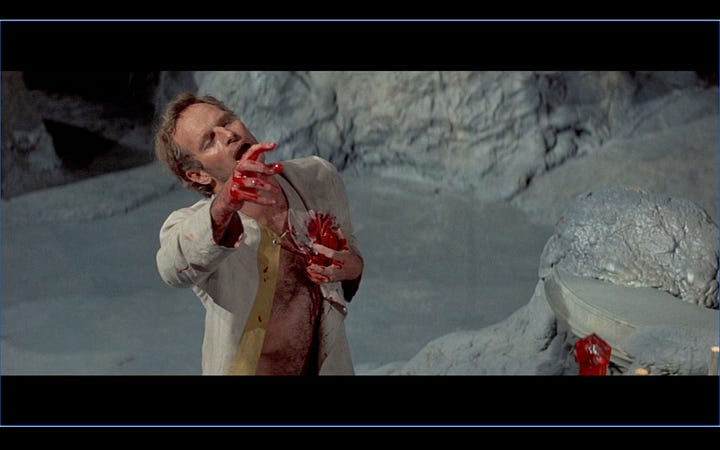
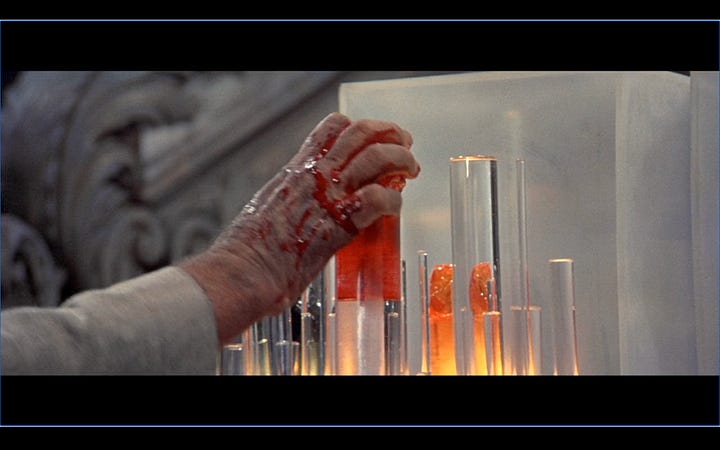
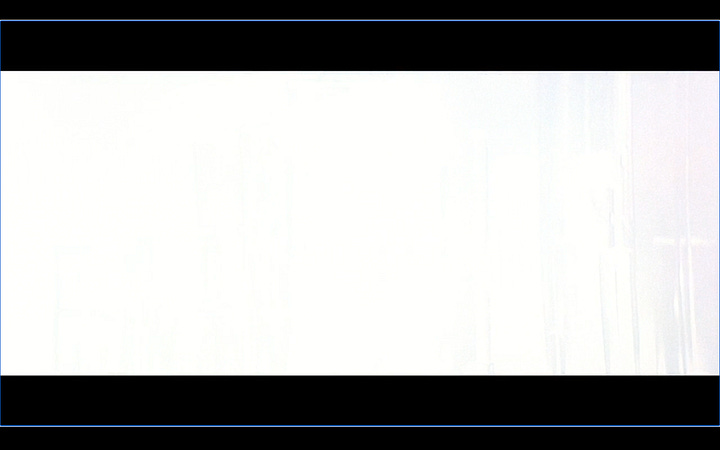
As the rumbling fades into silence and the white screen fades to black, a disembodied voice narrates:
Narrator: In one of the countless billions of galaxies in the universe, lies a medium-sized star, and one of its satellites, a green and insignificant planet, is now dead.
The credits roll, and no music plays.
I like to imagine audiences in 1970, my mother among them, going to the movies to see the epic sequel to Planet of the Apes and sitting in total silence after the sudden destruction of the entire planet.
It’s a dark twist that, in theory, comports with the bleak worldview of the first film. However, its execution is comically inept. It’s unearned. A voice we’ve never heard tells us our “insignificant planet is now dead.” It’s so matter of fact, so devoid of emotion. It’s a truly remarkable creative choice.
The issue isn’t that the ending is a bummer. Rather, the destruction of our entire planet is, somehow, a brutal anti-climax. The film just ends, and it’s a lot more humourous than it is thought-provoking. From befuddling start to bamboozling finish, Beneath the Planet of the Apes is certainly one of the worst films in the series. By dint of its insanity, it’s also one of my favorites, but for all the wrong reasons.
According to the film’s director, Ted Post, a television director prized for his efficiency, the film’s ending was a product of discord among 20th Century Fox executives. Darryl F. Zanuck and his son, Richard D. Zanuck, were battling for company control. Richard was ultimately fired in a humiliating fashion by his father. According to legend, Richard couldn’t pull out of his parking spot when he arrived at his car. Workmen were already painting over his name, and he had to wait until the paint dried. Richard arrived on set the next day and said, “Blow it up. Blow it all up!” So, taking a suggestion from Charlton Heston, the Alpha Omega bomb ended the Planet of the Apes.
Despite the fact that Beneath the Planet of the Apes is a terrible movie, the film made enough money to warrant a sequel: $19 million at the box office, leveraged against its $3 million production budget. Studio executives wanted more sequels, but how do you follow up a film that ends in a nuclear armageddon that kills the entire planet?
Find out next week, in part three of Acquired Taste’s Planet of the Apes Retrospective!
Until next week, don’t blow up the entire world, film freaks.





